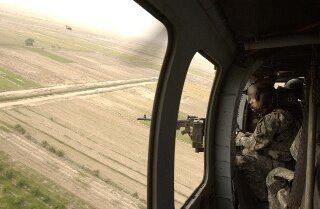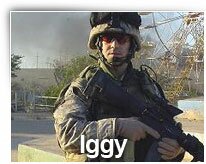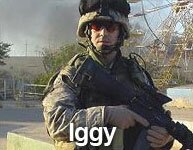This is the final in a weeklong special segment on Wounded Warriors. Thanks to Ralph Peters and The Wounded Warrior program for supporting these brave men and women. More importantly, thanks to these brave warriors who provide us with the humility we desperately need and the inspiration to become better people. They are true symbols of American resilience and courage. I can testify that I am a better man for having the privilege of being associated with them. It’s a long read, 2 articles, but well worth it. Semper Fi.
Wartime Moms
Wounded sons, mighty spirits
By Ralph Peters
FORT SAM HOUSTON, SAN ANTONIO — After four years of helping our severely wounded warriors struggle back, Judith “Mom” Markelz reserves her highest praise for their mothers and wives:
“Women are the strongest people in the world. They do whatever it takes. They give up a year, two years . . . the car is gone, the house is gone, they’ve lost their own medical insurance, but they stick to their husbands and sons.”
I sat down in the cramped “make do for now” Warrior and Family Support Center with two of those sturdy military moms, Joy Sparks and Rose Lage. Speaking through the good-natured tumult around us, they fought back tears as they told their tales of battlefield heroism, heartbreaking loss - and the struggle to recover.
Earthy and warm-hearted, Mrs. Sparks spoke first. As a former Navy petty officer first class, with a retired-military husband, she knows how the bureaucracy works - and uses her experience to help younger wives and mothers cope with the inevitable frustrations.
But this strong woman’s voice weakens as she tries to put her son’s experience into words. Spec. Christopher Sparks drove a Bradley Infantry Combat Vehicle in Echo Co., 1st of the 8th Cav. On a route-clearance mission, his vehicle was hit - by the seventh IED the 22-year-old had faced during his tour of duty.
No. 7 wasn’t lucky this time. Spec. Sparks suffered traumatic brain injuries from the blast - yet, amazingly, surged to drive on through the ambush, saving his buddies. He made it all the way back to Forward Operating Base Hope and safety.
Then he collapsed. Now he’s been at Brooke Army Medical Center for three months, with speech, memory and balance problems. But his mom prefers to focus on his progress: “With brain injuries, it’s tough . . . but he can stay on task now.”
Rose Lage’s family story is, if anything, more wrenching. Her son, Staff Sgt. Michael Lage, age 30, “doesn’t remember a lot” about what happened. But his 3rd Infantry Division comrades do. On a mission near Baghdad - on his third tour in Iraq - a remote-detonated bomb struck the NCO’s Humvee.
Of five soldiers in the vehicle, Lage was the lone survivor. The others were “blown to pieces,” in his mom’s words. When other soldiers reached him, her son was “found on fire, clinging to his weapon,” an Infantryman to the end.
Staff Sgt. Lage spent three weeks in intensive care. He had third-degree burns over 39 percent of his body - face, arms and torso. His left hand had to be amputated; he lost his right thumb.
But he’s a fighter, from a family of fighters. He’s recovered to the point where he can take short trips into San Antonio for a dinner out with his parents. On one such trip, this heroic soldier saw the worst side of our country. Mrs. Lage - a petite blond with a giant heart - can’t speak of it without choking up.
His parents took Michael to an Applebee’s. Everything went just fine - some good-hearted American even picked up their dinner tab anonymously. But, as they were leaving, a woman pointed at Michael and said, loudly, “Look at him! He only has half a face, he has no nose.”
Staff Sgt. Lage turned to the woman and explained that he looks that way because he was defending her freedom. And he walked out of the restaurant.
VETERANS who’ve suffered the worst injuries face that sort of heartlessness as they re-enter society. Helping them cope is the core mission of the new Warrior and Family Support Center - which still needs another $2 million before it can be completed. Your donations are critical.
Both Joy Sparks and Rose Lage are mature, confident, capable women - as well equipped to deal with the fates of their sons as any mothers could be. But they, too, have relied heavily on the overwhelmed temporary support center that the new facility will replace.
Both moms agreed that the interim center - one big, crowded room at present - is a wonderful place for the gravely wounded: “Here they’re accepted, nobody stares, and they all get the same treatment. We have to bring these soldiers out of their hospital rooms,” to get them really living again.
But the new facility will offer desperately needed privacy for reunited families, as well as resources and activities to help them on their march back. It’s going to be a special place - as close to a real home as possible, with shaded porches where burn victims can enjoy fresh air and special adaptations for those who’ve suffered catastrophic limb-loss.
The center covers a lot of other ground, too, from providing underwear and toiletries to wounded soldiers who arrive with nothing, to coming up with baby supplies for bewildered young mothers whose soldier-husbands remain in intensive care.
Mrs. Sparks and Mrs. Lage especially praise the outings the center coordinates to sporting events or shows - to help troops who’ve lost limbs or suffered disfiguring injuries learn that they’re still welcome among their fellow Americans (that wretched woman at Applebee’s notwithstanding).
These two moms are now fixtures at the center, volunteering between sessions with their sons to give other women a shoulder to cry on - and much-needed advice. They do all they can (including wearing cow hats that moo) to cheer up young wives and moms terrified by the changes their families face.
What experience has moved them the most? Both moms recall a soldier who’d taken a rocket hit through his back and stomach - yet mustered the will to live until he got back to the States to see the son born in his absence. After three weeks - and a family reunion - “he passed,” as Joy Sparks put it.
“You don’t see all the wounds,” Rose Lage added, “the mental and emotional ones. Some make it back, but some just can’t make it.” She’s troubled that so little attention is paid to female amputees - whose lives have been shattered.
Asked what they’d like to say to their sons in front of the American public, neither mother hesitated. Ma Sparks said, “I love you and support you.”
Eyes going damp again, Rose Lage said, “I’ve got you back!”
Splendid Valor
Heroes need our support
By Ralph Peters
FORT SAM HOUSTON, SAN ANTONIO — As I wrap up a week of columns dedicated to our wounded veterans, I have one great regret: We could only tell a limited number of stories in these pages, but every one of our wounded warriors deserves to have his or her tale told.
The soldiers and Marines who took a break from their therapy sessions to talk to The Post last week all have compelling histories; here are sketches of just a few more:
Airborne Infantryman Staff Sgt. Nick McCoy was on patrol in Iskandariyah when a roadside bomb took off his legs and left him with severe upper-body injuries. A rigorous soldier who took pride in his physical fitness, he’s seen his life change profoundly.
But Nick just won’t quit. The Mt. Penn, Pa., native is working on a book with his dad, exploring the personal side of the war from Iraq and from the home front. He’s thinking about a journalism degree, too. (I warned him it means a vow of poverty.)
During her second tour in Iraq, Sgt. Lilina Benning was driving her sergeant-major on the “safe” circular road at Camp Victory outside of Baghdad. A random terrorist rocket hit her SUV. Lilina lost her foot, but not her dedication to the Army. She’s determined to remain on active duty. Oh, and her brother’s in Iraq right now - on his second tour.
On the day I met Lilina, she was ecstatic - she’d just left her wheelchair and walked from the main hospital to the rehab center with only a cane.
Army medic Spec. Greg Dotson was on a bomb-clearing patrol north of Baqubah when an improvised explosive device got the drop on the convoy. He’ll never be able to serve as a combat medic again, but he’d like to share his battlefield expertise by teaching at the Army’s school for medics at Ft. Sam Houston. If that doesn’t work out, Greg’s going to finish college, teach school - and coach basketball.
These men and women aren’t going to be burdens on their communities. They’re going to become community leaders.
Then there’s Capt. Jeromie Smith, a former patient himself and now the company commander responsible for the wounded warriors and military staff at the Center for the Intrepid. He shepherds the newly wounded through phases of anger and depression, helping them form a new brotherhood among themselves.
Speaking of the men and women in his care, Capt. Smith summed up everything this week’s columns have been about: “They don’t want our pity - they want our respect. And they’ve earned it.”
There are so many more: NYPD and National Guard member Spec. Alexander Marner, an immigrant from Ukraine (and a veteran of the old Soviet Air Force) suffered a debilitating illness in Kuwait. He had to undergo a series of complex operations on his arms and legs. Now he’s anxious to get back to the NYPD after New Year’s.
On a “routine” supply run in Baghdad, West Point grad Capt. Christian Fierro was shot - by a medic who failed to clear her weapon properly. The round tore into his ankle and foot, shredding the artery, severing his Achilles tendon, and ripping out a chunk of meat and bone “the size of a softball.”
The new medic panicked. Capt. Fierro credits his gunner with saving his life.
After more than a dozen surgeries to save his foot, Chris still may lose it. But he’s determined to remain in the Army, even if he has to leave his beloved Field Artillery and take a desk job. He just wants to stay in uniform.
WE could’ve run weeks of columns about these magnificent young men and women. But we can all be proud of two things: these selfless wounded warriors themselves - and the generosity of Post readers, who’ve poured in donations to help make the new Warrior and Family Support Center a reality.
That said, more money needs to be raised. If you haven’t given, please consider a donation (see the box at left for how-to details).
Let me tell you a bit more about the organization dedicated to building this new refuge for the gravely wounded and their families. (I refuse to use the word “charity” where these heroes are concerned - helping disabled veterans is our duty.)
In this age of “nonprofit” scams and scoundrel CEOs, you have a right to know where your contributions will go. Well, out of every dollar you donate to this cause, 97.3 cents goes directly to the construction of the new center and our veterans. I doubt that even my lifelong favorite charity, the Salvation Army, can meet that 2.7 percent standard for administrative overhead.
How do those citizen-volunteers down in San Antonio do it? By being citizen-volunteers. The closest thing the effort has to a full-time employee is the woman (paid at an hourly rate) who does the accounting. No member of the oversight board receives a cent; there’s no six-figure CEO flying around in a personal jet and throwing lavish parties. In fact, there’s no CEO at all - just volunteers who want to help our troops.
(Speaking of volunteers, I have to close this series on a personal note - thanking one of them in particular. Eliza Sonneland, a recently retired Alamo-city talk-show host and an early advocate for this project, told me to stop blathering, get off my butt, come down to San Antonio and help. You were right, Eliza. Thanks. And God bless you.)
Finally, I have to confess that I expected to have a depressing time interviewing veterans who’d suffered massive burns and the loss of multiple limbs. I was wrong. Every single soldier and Marine I met inspired me with his or her determination, valor and positive outlook. Their courage is immeasurable - and beautiful.
Those wounded warriors are too humble and decent to ask us for one damned thing. But they need our help. Let’s not leave them behind this holiday season.



















